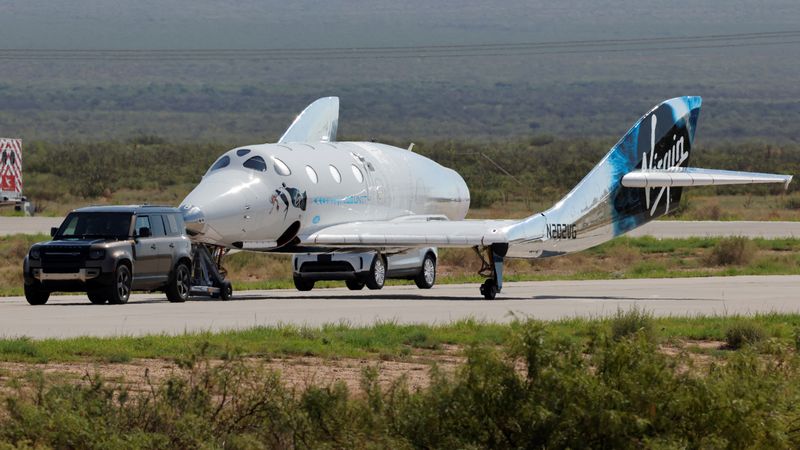
© Reuters. FILE PHOTO: Virgin Galactic’s passenger rocket plane VSS Unity is towed to the hangar after billionaire entrepreneur Richard Branson and his crew, reached the edge of space, at Spaceport America near Truth or Consequences, New Mexico, U.S., July 11, 2021.
By Joey Roulette
WASHINGTON (Reuters) -A carrier aircraft from Virgin Galactic took off with a crew of six from New Mexico on Thursday, the first spaceflight mission in nearly two years and the final planned test for the long-awaited commercial service of the space tourism firm founded by Richard Branson.
The company’s VMS Eve carrier plane took off from Virgin Galactic’s Spaceport America site around 11:17 a.m. Eastern time, Virgin Galactic said on Twitter. The aircraft is carrying a VSS Unity spaceplane with a crew that will launch to the edge of space within the next hour.
Virgin Galactic’s Unity 25 mission comes 22 months after billionaire Branson and employees rode to the edge of space aboard its centerpiece SpaceShipTwo spaceplane. It had hoped that high-profile mission would open the door to routine flights soon after.
But a safety probe into Branson’s flight by the U.S. Federal Aviation Administration hampered the company’s near-term plans, as did a lengthy spacecraft upgrade period that lasted longer than Virgin Galactic anticipated.
If all goes well, Virgin Galactic hopes to fly its first commercial mission in late June, a long-delayed research flight chartered for the Italian Air Force. The company then expects to carry out a mission roughly every month.
Virgin Galactic pilots Jameel Janjua and Nicola Pecile are piloting the carrier aircraft VMS Eve and will drop the spaceplane when it reaches around 50,000 feet in altitude. The spacecraft, once untethered, will ignite a rocket engine and climb to an altitude in microgravity of roughly 50 miles, the U.S.-recognized boundary of Earth’s atmosphere.
The test mission, lasting roughly 90 minutes from takeoff to the spaceplane landing after spending three minutes in microgravity, follows the type of rides Virgin Galactic intends to provide for a backlog of some 800 customers. Most have paid between $250,000 and $450,000 for a ticket.
The company in April conducted a successful glide test with VSS Unity, dropping it at 47,000 feet for a free-fall back to its runway, without having ignited its engine to go toward space.
Mike Masucci and CJ Sturckow will pilot the spaceplane. In the cabin will be the company’s chief astronaut instructor Beth Moses, astronaut instructor Luke Mays, senior engineering manager Christopher Huie and Jamila Gilbert, internal communications senior manager.
Stay connected with us on social media platform for instant update click here to join our Twitter, & Facebook
We are now on Telegram. Click here to join our channel (@TechiUpdate) and stay updated with the latest Technology headlines.
For all the latest Business News Click Here
For the latest news and updates, follow us on Google News.
